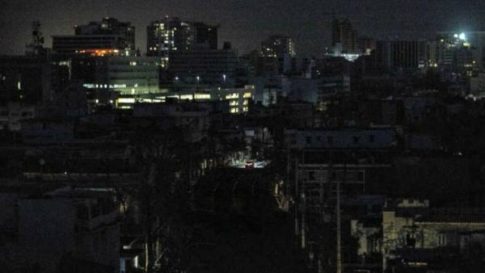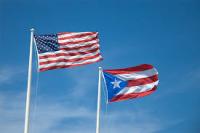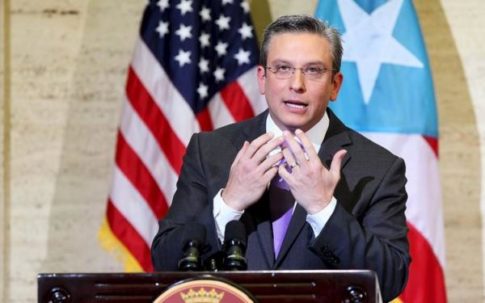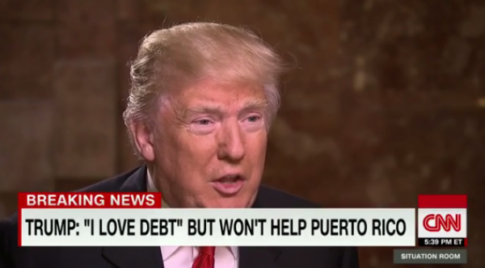“We thought the cash was going to be a problem… [but] the magnitude of this is something we haven’t experienced…”
– Fed’s Dudley Sent Puerto Rico A “Plane Loaded With Cash”:
In the days following Hurricane Maria’s devastating blow to Puerto Rico, air traffic on the island came to a complete standstill as airport damage prevented commercial pilots from servicing the island. That said, with the island economy grinding to a halt, San Juan International apparently managed to find a way to accept one very important plane…a “jet loaded with an undisclosed amount of cash” from New York Fed president William Dudley. Per Bloomberg:
Less than a week into the massive blackout that followed Hurricane Maria and essentially turned Puerto Rico into a cash-only economy, one top local banker became so concerned about the supply of bills that he called the Federal Reserve.
William Dudley, the New York Fed president, put the word out within minutes, and ultimately a jet loaded with an undisclosed amount of cash landed on the stricken island, according to Richard Carrion, the Popular Inc. executive chairman who made the call. He and Chief Executive Officer Ignacio Alvarez reflected on the chaotic early days of the crisis in an interview Friday at their office in San Juan’s Hato Rey financial district.
“We thought the cash was going to be a problem,” said Carrion, 64, whose bank is the biggest in Puerto Rico by deposits. “The magnitude of this is something we haven’t experienced.” Suzanne Elio, a New York Fed spokeswoman, declined to comment on the money shipment.
The executives described corporate clients’ urgent requests for hundreds of thousands in cash to meet payrolls, and the challenge of finding enough armored cars to satisfy endless demand at ATMs. Such were the days after Maria devastated the U.S. territory last month, killing 39 people, crushing buildings and wiping out the island’s energy grid. As early as the day after the storm, the Fed began working to get money onto the island, according to a person with knowledge of the matter, who asked not to be named discussing the Fed’s preparations.
Of course, as we’ve noted before, nearly three weeks after Hurricane Maria made landfall in Puerto Rico on September 20th, some 90% of the island is still without power and the resulting damage to the local economy will undoubtedly have long-lasting effects.
Nine of ten Puerto Ricans are still without power, half the island has no drinking water, schools are closed, there’s a government-mandated curfew — and businesses everywhere are trying to cope. At Popular, half of branches remained shuttered Friday, as did two-thirds of ATMs.
Alvarez, 58, is a Harvard Law School graduate who took over as Popular’s CEO earlier this year. Previously, the post was held by Carrion, whose family has helped run the firm for generations. Alvarez said that stores have closed and workers have been laid off as a result of the storm, which is a worry for the bank.
“More than property damage to our collateral, which is not going to be that great, is the economic disruption caused by the hurricane,” he said.
The lack of power was a nightmare for dialysis and cancer patients, as well as the elderly trapped in condominiums without air conditioning. The blackout also means that this corner of credit-card dependent America is relearning how to function almost entirely in cash. When some generator-powered ATMs finally opened, lines stretched hours long, with people camping out in beach chairs and holding umbrellas against the sun.
Popular could face a downgrade by Fitch Ratings on concerns that the storm’s after-effects may harm business. Its stock has dropped 11 percent since the storm in New York trading, and is down 19 percent for the year.
Meanwhile, the even larger threat to the Puerto Rican economy is that residents will simply decide they’ve had enough of the island life, and the constant threat of devastating hurricanes that comes along with it, and jump ship to the mainland. As Bloomberg notes, the island already loses roughly 2% of its population a year to the continental United States but, with many people being evacuated in the days following September 20th, it’s very likely that 2017 will see a much larger exodus.
A major concern, both men agreed, was the prospect of a mass exodus to the U.S. mainland. Governor Ricardo Rossello has warned that, if the aid package being debated in Washington falls short, “millions” could leave the island. The population has already been shrinking 2 percent annually for three years running on the island of 3.4 million, due in large part to a decade-long economic lull.
“There is a danger” of flight, Carrion said. “I don’t need a visa. I don’t need anything to go there. I have relatives in Orlando, or I have relatives in Houston, or I have relatives in New Jersey.”
“Everybody has relatives in the states,” said Alvarez, cutting him off.
“Yeah, everybody,” Carrion said. “There’s more Puerto Ricans in the continental U.S. than here. So everybody’s got a relative.”
…all of which has Democrats laying out the welcome mats in the key swing state of Florida…never let a good crisis go to waste
* * *
PayPal: Donate in USD
PayPal: Donate in EUR
PayPal: Donate in GBP





